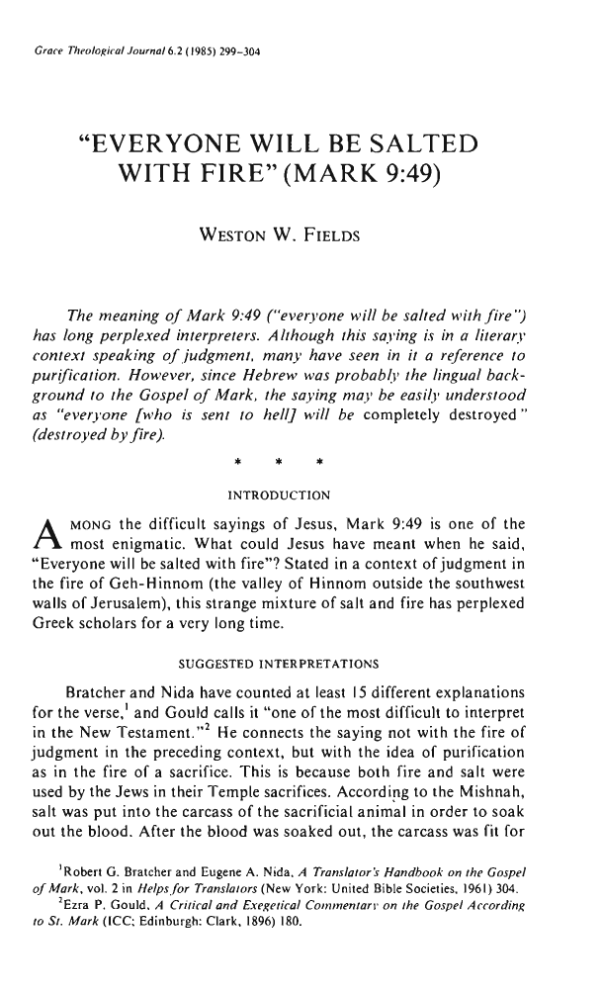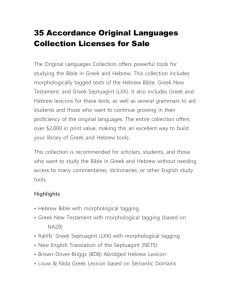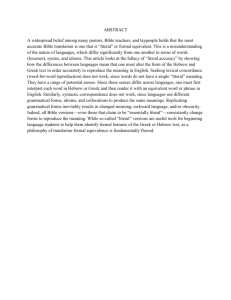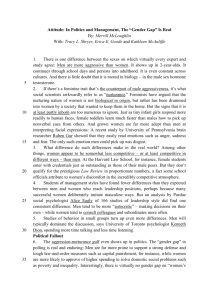"'Everyone will be salted with fire' (Mark 9:49)," Grace Theological

Gra ce Theolo g ical Jo urnal 6 .2 (1985 ) 2 99-304
"EVERYONE WILL BE SALTED
WITH FIRE" (MARK 9:49)
WESTON W. FIELDS
The meaning of Mark 9:49 ("everyone will be salted with fire " ) ha s long perplexed interpreters. Although this saying is in a literar y
context speaking of judgment, many have seen in it a reference to purification. However, since Hebrew was probab~l' the lingual background to the Gospel of Mark, the saying may be easily understood
as "everyone [who is sent
/0
hell] will be completely destroyed"
(des/royed by fire).
* * *
INTRODUCTION
A
MONG the difficult sayings of Jesus, Mark 9:49 is one of the most enigmatic. What could Jesus have meant when he said,
"Everyone will be salted with fire"? Stated in a context of judgment in the fire of Geh-Hinnom (the valley of Hinnom outside the southwest walls of Jerusalem), this strange mixture of salt and fire has perplexed
Greek scholars for a very long time.
SUGGESTED INTERPRETATIONS
Bratcher and Nida have counted at least 15 different explanations for the verse, t and Gould calls it "one of the most difficult to interpret in the New Testament.
,,2
He connects the saying not with the fire of judgment in the preceding context, but with the idea of purification as in the fire of a sacrifice. This is because both fire and salt were used by the Jews in their Temple sacrifices. According to the Mishnah, salt was put into the carcass of the sacrificial
anim~1
in order to soak out the blood. After the blood was soaked out, the carcass was fit for
I
Robert G. Bratcher and Eugene A. Nida. A Translator's Handb oo k on lhe G os pel o.
lMark, vol. 2 in Helpslor TranslalDrs (New York: United Bible Societies, 1961) 304.
2Ezra P. Gould, A Critical and Exegetical Commentar y on the Go s pel Ac co rding
to St. Mark (ICC; Edinburgh: Clark, IS96) ISO.
300 GRACE THEOLOGICAL JOURNAL consumption or sacrifice: "The priest ... dried it by rubbing salt on it
[the carcass of the sacrificial animal] and cast it on the fire."]
The interpretation that the salt and fire have something to do with purification or with dedication is in general the same one taken by Montefiore, Rawlinson, A. B. Bruce, Alford, Calvin, Meyer,
Lange, Lane, Fudge, and F. F. Bruce.
4 It is evident as well in TEV's translation, "Everyone will be purified by fire as a sacrifice is purified by salt."
Such connection of the verse with sacrifice also appears in its textual variants. Evidently the incomprehensibility of the verse led some scribe to make a marginal note (which later found its way into the text proper) or to make an outright change in the text. Whichever it was, this change involved lifting part of a phrase out of the LXX of
Lev 2: 13 and adding it to this text. The phrase is: ltUV ociipov Sucriu~
Ullciiv uAi UAtcrS"crE1:Ul I 'everyone of your sacrificial gifts will be salted with salt'. This connection with Leviticus is seen clearly in the two main forms of the additions to the verse: (I) ltucru yap Sucriu uAi
UAtcrS"crE1:m (D itb.c.d,ff'.i, 'for every sacrifice will be salted with salt') and (2) ltU~ yap ltupi UAlcrS"crETUl Kui ltucru Sucriu aAi UAlcrS"crE1:Ul
(A K Byz ai, 'for everyone will be salted with fire, and every sacrifice will be ' salted with salt'). This last form seems to be a conflation of the shortest version of the verse and the version of intermediate length.
Several other versions of the verse, which appear in only one manuscript each, also seem to be the result of scribal attempts to make some kind of sense out of the verse. Three of the four other possibilities mentioned by Metzger have something to do with being
"consumed" or "destroyed.,,5
'Philip Blackman. trans., Order Kodashim. vol. 5 in Mishna),oth (Gates head:
Judaica. 1983) 43.
4G. C. Montefiore, The Synoptic Gospels, with a series of additional notes by
I. Abrahams (3 vols.; London: Macmillan, 1909) I. 233; A. E. J. Rawlinson, St. Mark
(7th ed.; London: Methuen, 1949) 131; A. B. Bruce, "The Synoptic Gospels" in
The Expositor s
Greek Testament (ed. W. Robertson Nicol]; London: Hodder and
Stoughton, 1897) I. 407; Henry Alford, Alford's Greek Testament (Grand Rapids:
Guardian, reprinted, 1976) I. 380; John Calvin, A Harmony of the Gospels Marthew,
Mark and Luke, vol. I in Calvins Commentaries (ed. David W. Torrance and Thomas F.
Torrance; Grand Rapids: Eerdmans, reprinted, 1975) 176-77; H. A. W. Meyer,
A Critical and Exegetical Hand-hook to the Gospels of Mark and Luke (ed. R. E.
Wallis. W. P. Dickson, and M. B. Riddle; New York: Funk and Wagnalls, 1884)
120-23; John Peter Lange, The Gospel According to Mark, revised with additions by
W. G. T. Shedd, vol. 8 in Commentary on the Holy Scriptures (Grand Rapids:
Zondervan. reprinted, 1971) 90-91; William L. Lane, The Gospel According to Mark
(NICNT; Grand Rapids: Eerdmans, 1974) 349; Edward William Fudge, The Fire That
Consumes (Houston: Providential. 1982). 186-87; and F. F. Bruce, The Hard Sayings of Jesus (London: Hodder and Stoughton, 1983) 38-39. sBruce M. Metzger, A Textual Commentary on the Greek New Testament (London and New York: United Bible Societies, 1971) 102-3.
FIELDS: SALTED WITH FIRE (MARK 9 : 49)
301
Most modern interpreters of the passage have not advanced much beyond these ancient scribes. In fact one gets the feeling that many commentators are not happy with their own conclusions; yet the absence of a better alternative, coupled with the fact that in the
Temple sacrifices salt and fire were found together, has led most interpreters to apply the purificational and dedicatory objectives of the sacrifices to Jesus' statement about the individuals in the passage under consideration. It is as though many of the commentators knew intuitively that the verse cannot say what it seems to say in Greek, for a figure of speech based on these two features among the many elements of a sacrifice hardly seems to fit the immediate context of
Mark's narrative, even if Jesus' statement is purely metaphorical. Yet
Mark or Mark's source must have felt that it made sense of some kind, even though the sense is not now obvious.
AN ALTERNATIVE INTERPRETATION
Perhaps the solution is not to be found in the Greek text. This is one more saying of Jesus which is easily unlocked when it is translated into Hebrew, currently considered by a number of scholars to be the best candidate for the language of Jesus and of the earliest accounts of his life. A couple of questions may be asked to ascertain whether a
Hebrew translation helps clarify the meaning of the Greek text.' Does the semantic range for the word "salt" in Hebrew give any clues about what an expression like "salted with fire" (llupl CtAICl91'!()£1:m) might have meant as an idiom in Hebrew? Could it be that a Hebrew expression was translated literally into Greek, not dynamically, and that in the course of time, as those who would recognize the Hebrew idiom behind the statement became fewer and fewer , the original meaning of it became lost?
There is indeed a Hebrew expression which can answer these questions and solve the problem. Mark 9:49 is one of many passages in Mark (some of which have been noted elsewhere by Lindsey)' in which it is possible to translate word for word back into Hebrew and not even change the word order. Lindsey suggests the translation n21,); tzi~~ tzi'l:t 7i.
8 The UBS Modern Hebrew New Testament suggests
'cr. Robert L. Lindsey, "A Modified Two-Document Theory of the Synoptic
Dependence and Interdependence," NovT6 (1963) 245-47; idem , A Hebrew Translation
of the Gospel of Mark (2d ed.; Jerusalem: Dugith, 1973) xxix-xxvi; and David Bivin and Roy B. Blizzard. Understanding the Difficulr Words qf Je s us (Arcadia, CA: Makor
Foundation, 1983). See also Weston W. Fields ("Understanding the Difficult Words of
Jesus: A Review Article," GTJ 5 [1984] 271-88) for a more complete listing of the artic1es and books supporting Hebrew originals for the Synoptics and those supporting
Aramaic originals for the Synoptics.
7Undsey. A Hebrew Translation qf the Go s pel of Mark, xxix-xxvi.
'Ibid., 125.
302 GRACE THEOLOGICAL JOURNAL the addition of FT at the beginning of Mark 9:49 to account for the yap in Greek.' Delitzsch, following the Byzantine text-type, translates, n'?1?; n?l?~ 1~';1i?-7~! n'?1?; lV~~ lV'(\-7~ '~. to
Among the several usages of the word n71J, the predominant one is usually translated "to salt." But there is another usage of n71J which
Even-Shoshan defines with the term "'?il / 'to destroy', and lV\i1!lt; / 'to erase d l Alcalay translates the expression n71J C'PIJ lIi' / 'to destroy completely',12 for which the literal translation is "to sow a place with salt," an action described in Judg 9:45. There Abimelech destroys
Shechem. One of the actions which was part of the destruction was sowing salt in the city. This is an illustration of the background of what, according to A\calay, is a figurative expression for complete destruction~to be salted is to be destroyed.
The verb also is found in the passive in Isa 51 :6, where Even-
Shoshan suggests the glosses
",?~,
PlJ1!il,
and
iJiSN
13
/
'decay, vanish',
'to be pulverized', and 'to disintegrate', and the LXX translates with
ECl'tEPEciJ9T] / 'negated', 'taken away', 'destroyed'.
Could the translation "to destroy" in place of "to salt" illuminate the meaning of Mark 9:49? The new translation first must be tested in the immediate context. In the preceding verses Mark records Jesus' warnings about offending "these little ones" and Jesus' suggestions that one would be better off to rid himself of offending parts of his body than to be cast into hell, where the fire never goes out and "their worm does not die."
14
It would fit this context perfectly to translate
9:49, "everyone [who is sent to hell] will be completely destroyed"
(destroyed by fire).
Undoubtedly the Hebrew expression literally translated in Mark's
Greek source would have been understood figuratively by its first readers; but once the Gospel left the world of Palestinian Judaism and its Hebrew constituency, the meaning of the phrase was eventually forgotten and has remained ambiguous to most, though not all, interpreters throughout the Christian era.
15
9
TlIU
,n;, n"JTl (Jerusalem: 1U"PTl 'Jn~7 n"n'X~Tl m'JnTl, 1979). w lUt:l717' ~'x'~, n"~17
)1IU" )1' p1U7~ C'Tln17l TlIU,n" n"JTl (London: Trinitarian
Bible Society, 1968).
II
A vraham Even-Shoshan, 11l10 v 11'lilo (Jerusalem: Kiryath Sefer, 1983 [Hebrew])
697.
12Reuben Alcalay, The Complete Hebrew-English Dictionary (Jerusalem: Massada, 1981) col. 1345. i3 Ibid.
14A hyperbole quoted from lsa 66:24, which evidently refers to an inexhaustible supply of dead bodies upon which worms may feed (and thus not die for lack of food).
15After this article was completed, H. J. de Jonge (private communication,
February 9,1985) kindly pointed out that several centuries ago two well-known Dutch
FIELDS : SALTED WITH FIRE (MARK 9 : 49 ) 303
CONCLUSION
' AAlt;w , then , is perhaps another example of the way in which the Greek lexicon needs to have its glosses expanded at certain points to take account of the multilingual situation in first century Palestine, a situation also much influenced by the LXX. This Septuagintal influence is already recognized by Bauer, Arndt, Gingrich, and
Danker, who say in the introduction to their lexicon that "as for the influence of the LXX, every page of this lexicon shows that it outweighs all other influences on our literature."
16
There are a number of references in BAGD to Greek words whose semantic range was expanded by this multilingual influence.
One of these is the word 8iKUIO(;, used by Matthew in the narrative about Joseph, who was a "8iKUIO(; man" (Matt 1:19). Much better sense is made of the passage if one translates "merciful" for 8iKUIO(; in this context, rather than "righteous," and the translation "merciful" is suggested by BAGD. This accords well with the range of the Hebrew word ;]P,:S, which either lies behind the Greek 8iKUIO(; or influenced it. This is plausible because ;]P':S has a total semantic range which is broader than that of 8iKUIO(;-a range which includes usages which are best glossed in English by the word "merciful.
,,17
There are a number of other words in the Greek lexicon which have been glossed too narrowly in English. One must not forget that usage defines meaning, and the meaning of a Greek word in the NT is what is meant to its writer and first readers. If that meaning was influenced by the use of Hebrew / Aramaic side by side with Greek, and by the sometimes rather literalistic rendering of the Hebrew OT into Greek in the LXX, then the most accurate glosses of Greek in any bilingual dictionary (such as our Greek-English lexicons) will be those which take account of these facts. There is yet much progress to be made in this area, and that progress is perhaps furthered yet a little more by understanding that in Mark 9:49 a Hebrew idiom was translated into Greek and is best glossed into English as suggested above. exegetes proposed this very interpretation. These interpreters provide independent confirmation of the plausibility of the solution to this passage suggested in this article, a solution which de Jonge calls "plausible indeed." See H. Grotius, Ann o /a/i o ne s in
Libras Evangeliorurn (Amsterdam: Cornelium Blaeu. 1641) 568-70; and J. Clericus,
Novum Testamentum Domini Nastri Jesu Christi (2d ed.; Frankfurt: Thomas Fritsch ,
17l4) 243-44.
16 BAGD, xxi.
17See A1calay, The Complete Hebrew-English Dictionary, cols. 2155-56.
304
GRACE THEOLOGICAL JOURNAL
Since Aramaic also has the verb n'm, if one prefers to posit
Aramaic rather than Hebrew originals for the sources behind the
Greek Synoptics, the interpretation suggested here would probably still be valid.
18 Everyone who is cast into hell will not be salted, but will be destroyed. I.
"Although Marcus Jastrow (A Dictionary '!f the Targumim . the Talmud Bibli. and Yerushalmi. and the Midrashic Literature [Brooklyn: P. Shalom, 1967] 788) does not suggest a gloss like " destroy " for the Aramaic verb , he does list contexts in which salt is considered as much an agent of destruction as it is an agent of preservation. The standard reference books for Aramaic backgrounds do not discuss this pass age (cf. Gustaf Dalman, The Words '!f Jesus [Edinburgh: Clark, 1902]; Matthew
Black, An Aramaic Approach to the Gospels and Acts [3d ed.; Oxford: Clarendon,
1967]; and J.A. Fitzmyer, Essays on the Semitic Ba c kground of the New Testament
[London: Geoffrey Chapman, 1971]).
!
9I.
e .. "punished." This verse does not decide the question recently raised again in
Fudge's book (see n. 4 above) concerning everlasting punishment or annihilation of the wicked. If UAlOeitUEl"Ol is a metaphorical term for the more common NT an:oAAuJ.U
, it s hould probably be understood in the general theological sense or"'perish " or "be lost"
(see LSJ, 207).








